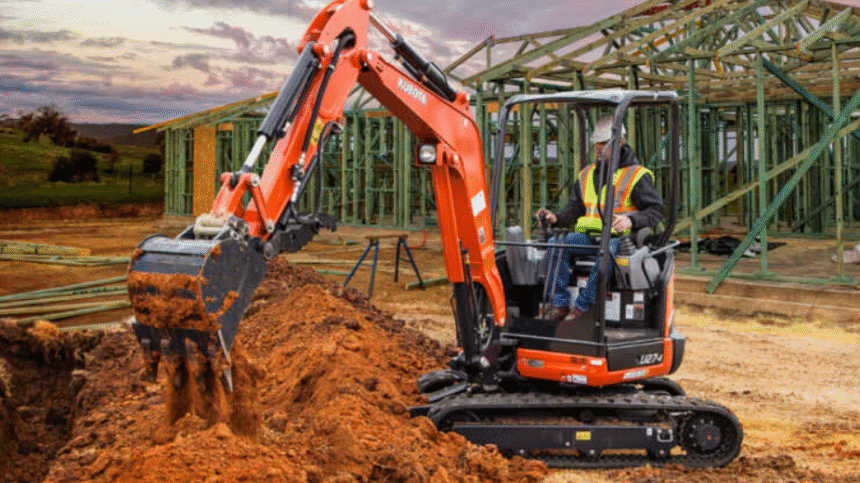Operating heavy machinery, especially excavators, comes with its own set of challenges. In the construction industry, the damage can be caused due to inadequate attention. Be it in terms of expensive losses, project delays, or even life-threatening situations.
These six common excavator-associated issues will affect your efficacy, safety, and equipment wear. Read along to learn how to resolve these issues before they create problems for you at work.
1. Improper Machine Positioning and Setup
One of the most fundamental mistakes operators make is incorrect machine positioning. Setting up on unstable ground or failing to properly level the excavator creates hazardous working conditions and reduces operational efficiency.
Always analyze the specific surface before you place your excavator. When possible, make use of outriggers and guarantee they are deployed on solid ground.
Use leveling gauges to check and ensure proper placement along with maintaining adequate distance from trenches and excavation edges— 2 feet for every foot of depth.
Note: Proper positioning guarantees safety but, more importantly, enhances overall digging performance and accuracy.
2. Neglecting Daily Inspections and Maintenance
In the rush to meet project deadlines, many operators forgo pre-operation inspections. That, however, leads to unscheduled failures, unsafe working conditions, and a lot of early wear and tear on machines.
Create an exhaustive pre-operation checklist that includes fluid level checks, leak inspections of hydraulic components, track/tyre inspection, control, and safety equipment operation. Write the findings down and resolve any issues instantly. A quick inspection of 15 minutes can prevent hours or days of downtime down the line.
3. Improper Bucket Techniques and Loading Practices
Inefficient bucket handling is one of the primary indicators of inexperience or an operator lacking a great deal of care. The operator oversight that leads to this is commonly known as the phenomena of overfilling the bucket, utilizing the teeth to pry or hammer, and poor offloading techniques while dealing with trucks.
Adjust the bucket stowed position to the machine’s operational capability and material density. The bucket should be filled with smooth, steady motions. Trucks should be optimally positioned for loading, which is usually 45 degrees to the excavator.
Loaded buckets should never be swung above workers or other equipment, and should not be used for unwarranted activities, like telescoping or lifting personnel. For this, get proper excavator training and enroll in the specialized course.
4. Ignoring Blind Spots and Site Awareness
Professional operators often develop poor awareness practices in their work areas. Operators must pay regular attention to all surroundings because excavators create numerous blind zones that can lead to accidents involving workers, structures or underground pipes.
Always perform a complete site survey before beginning work. Know key facility structures and hazards on the site. Machine operators should rely on designated spotting assistance during blind and congested sight areas.
Mirrors and cameras on equipment should be utilized, and the practice of looking for hazards in all directions before making movements or operating the boom should be standard.
5. Overworking the Hydraulic System
Pushing hydraulic systems to work more than their in-built capability decreases efficiency and increases wear and tear. Signs include operating at maximum throttle constantly, overheating, and jerky control movements.
Run at the appropriate throttle setting for the task rather than always full-on. In cold weather, let the hydraulic fluid warm up before asking for full performance. You want your moves to be fluid and controlled instead of jerky directional changes. While working in extreme conditions, make frequent use of system breaks and check hydraulic fluid temperatures.
6. Incorrect Track or Machine Travel Techniques
The improper use of travel methods generate destructive force against vehicle tracks along with undercarriage parts and environmental elements. Numerous operators make their vehicles unstable while restricting visibility by extending booms and elevating buckets too tall.
Keep the machine in its centre position while you’re driving, and only raise the bucket high enough to clear terrain obstacles (1-2 feet off the ground). Boom and stick have to be positioned properly for your best view while travelling. You walk, and your machines are distributed to face uphill on slope terrain rather than horizontally to avoid sliding when going up and down. Change your speed level based on what the ground looks like, yet minimize any quick turns.
Conclusion
To operate excavators effectively one needs to know controls properly yet it is essential to be alert while maintaining correct techniques and respecting operational boundaries of both equipment and capabilities. Staying clear of these six normal errors will lead to an extended excavator lifespan yet simultaneously boost your site productivity through improved fuel efficiency alongside safer work conditions for everyone.
Ready to take your excavator operation skills to the next level? Invest in proper excavator training, and regular practice, and always prioritize safety over speed. Your project timelines, equipment, and team will thank you for it.















